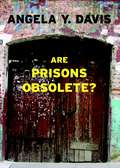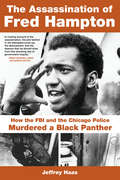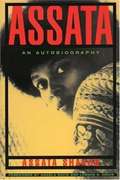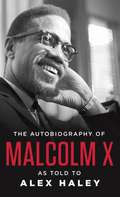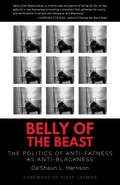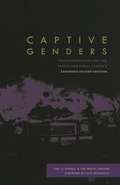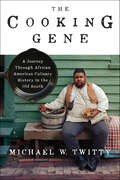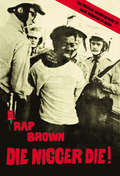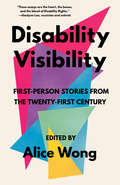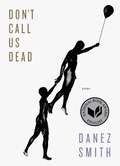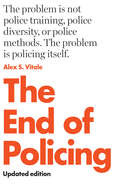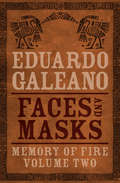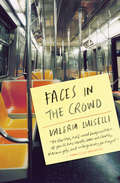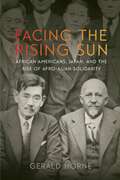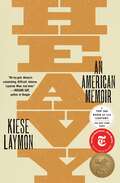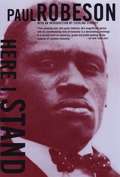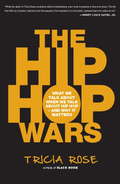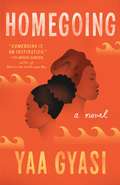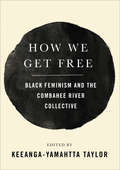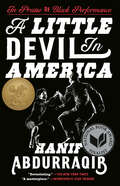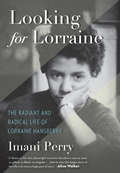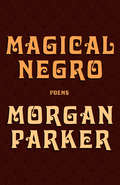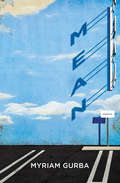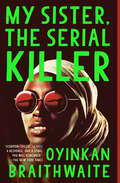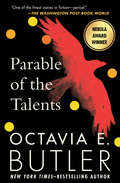Special Collections
Noname's Book Club
Description: Chicago rapper Noname has launched her own book club! Noname's selections will highlight progressive work from writers of Color and writers within the LGBTQ community. #bookclub
- Table View
- List View
Are Prisons Obsolete?
by Angela Y. DavisWith her characteristic brilliance, grace and radical audacity, Angela Y. Davis has put the case for the latest abolition movement in American life: the abolition of the prison. As she quite correctly notes, American life is replete with abolition movements, and when they were engaged in these struggles, their chances of success seemed almost unthinkable. For generations of Americans, the abolition of slavery was sheerest illusion. Similarly,the entrenched system of racial segregation seemed to last forever, and generations lived in the midst of the practice, with few predicting its passage from custom. The brutal, exploitative (dare one say lucrative?) convict-lease system that succeeded formal slavery reaped millions to southern jurisdictions (and untold miseries for tens of thousands of men, and women). Few predicted its passing from the American penal landscape. Davis expertly argues how social movements transformed these social, political and cultural institutions, and made such practices untenable.In Are Prisons Obsolete?, Professor Davis seeks to illustrate that the time for the prison is approaching an end. She argues forthrightly for "decarceration", and argues for the transformation of the society as a whole.
The Assassination of Fred Hampton
by Jeffrey HaasUncovering a cold-blooded execution at the hands of a conspiring police force, this engaging account relentlessly pursues the murderers of Black Panther Fred Hampton. Documenting the entire 14-year process of bringing the killers to justice, this chronicle also depicts the 18-month court trial in detail. Revealing Hampton himself in a new light, this examination presents him as a dynamic community leader whose dedication to his people and to the truth inspired the young lawyers of the People's Law Office, solidifying their lifelong commitment to fighting corruption. Contending with FBI stonewalling and unlimited government resources bent on hiding a darker plot, this reconstruction relates an inspiring narrative of upholding morality in one man's memory.
Assata
by Assata Shakur and Angela Y. Davis and Lennox S. HindsOn May 2, 1973, Black Panther Assata Shakur (aka JoAnne Chesimard) lay in a hospital, close to death, handcuffed to her bed, while local, state, and federal police attempted to question her about the shootout on the New Jersey Turnpike that had claimed the life of a white state trooper. Long a target of J. Edgar Hoover's campaign to defame, infiltrate, and criminalize Black nationalist organizations and their leaders, Shakur was incarcerated for four years prior to her conviction on flimsy evidence in 1977 as an accomplice to murder. This intensely personal and political autobiography belies the fearsome image of JoAnne Chesimard long projected by the media and the state. With wit and candor, Assata Shakur recounts the experiences that led her to a life of activism and portrays the strengths, weaknesses, and eventual demise of Black and White revolutionary groups at the hand of government officials. The result is a signal contribution to the literature about growing up Black in America that has already taken its place alongside The Autobiography of Malcolm X and the works of Maya Angelou. Two years after her conviction, Assata Shakur escaped from prison. She was given political asylum by Cuba, where she now resides.
The Autobiography of Malcolm X
by Malcom X and Alex HaleyMemoir of Malcolm X , the dynamic American black militant, religious leader and activist who articulated the anger, the struggle, and the beliefs of African Americans in the 1960s.
Belly of the Beast
by Da'Shaun L. HarrisonExploring the intersections of Blackness, gender, fatness, health, and the violence of policing.To live in a body both fat and Black is to exist at the margins of a society that creates the conditions for anti-fatness as anti-Blackness. Hyper-policed by state and society, passed over for housing and jobs, and derided and misdiagnosed by medical professionals, fat Black people in the United States are subject to sociopolitically sanctioned discrimination, abuse, condescension, and trauma. Da&’Shaun Harrison--a fat, Black, disabled, and nonbinary trans writer--offers an incisive, fresh, and precise exploration of anti-fatness as anti-Blackness, foregrounding the state-sanctioned murders of fat Black men and trans and nonbinary masculine people in historical analysis. Policing, disenfranchisement, and invisibilizing of fat Black men and trans and nonbinary masculine people are pervasive, insidious ways that anti-fat anti-Blackness shows up in everyday life. Fat people can be legally fired in 49 states for being fat; they&’re more likely to be houseless. Fat people die at higher rates from misdiagnosis or nontreatment; fat women are more likely to be sexually assaulted. And at the intersections of fatness, Blackness, disability, and gender, these abuses are exacerbated. Taking on desirability politics, the limitations of gender, the connection between anti-fatness and carcerality, and the incongruity of &“health&” and &“healthiness&” for the Black fat, Harrison viscerally and vividly illustrates the myriad harms of anti-fat anti-Blackness. They offer strategies for dismantling denial, unlearning the cultural programming that tells us &“fat is bad,&” and destroying the world as we know it, so the Black fat can inhabit a place not built on their subjugation.
Captive Genders
by Eric A. Stanley and Nat SmithThe intersection of transgender, gender variant, and queer identity with the crushing force of the Prison Industrial Complex.
The Cooking Gene
by Michael W. Twitty2018 James Beard Foundation Book of the Year | 2018 James Beard Foundation Book Award Winner inWriting | Nominee for the 2018 Hurston/Wright Legacy Award in Nonfiction | #75 on The Root100 2018A renowned culinary historian offers a fresh perspective on our most divisive cultural issue, race, in this illuminating memoir of Southern cuisine and food culture that traces his ancestry—both black and white—through food, from Africa to America and slavery to freedom.Southern food is integral to the American culinary tradition, yet the question of who "owns" it is one of the most provocative touch points in our ongoing struggles over race. In this unique memoir, culinary historian Michael W. Twitty takes readers to the white-hot center of this fight, tracing the roots of his own family and the charged politics surrounding the origins of soul food, barbecue, and all Southern cuisine. From the tobacco and rice farms of colonial times to plantation kitchens and backbreaking cotton fields, Twitty tells his family story through the foods that enabled his ancestors’ survival across three centuries. He sifts through stories, recipes, genetic tests, and historical documents, and travels from Civil War battlefields in Virginia to synagogues in Alabama to Black-owned organic farms in Georgia. As he takes us through his ancestral culinary history, Twitty suggests that healing may come from embracing the discomfort of the Southern past. Along the way, he reveals a truth that is more than skin deep—the power that food has to bring the kin of the enslaved and their former slaveholders to the table, where they can discover the real America together.Illustrations by Stephen Crotts
Die Nigger Die!
by H. Rap BrownMore than any other black leader, H. Rap Brown, chairman of the radical Black Power organization Student Nonviolent Coordinating Committee (SNCC), came to symbolize the ideology of black revolution. This autobiography--which was first published in 1969, went through seven printings and has long been unavailable--chronicles the making of a revolutionary. It is much more than a personal history, however; it is a call to arms, an urgent message to the black community to be the vanguard force in the struggle of oppressed people. Forthright, sardonic, and shocking, this book is not only illuminating and dynamic but also a vitally important document that is essential to understanding the upheavals of the late 1960s. University of Massachusetts professor Ekwueme Michael Thelwell has updated this edition, covering Brown's decades of harassment by law enforcement agencies, his extraordinary transformation into an important Muslim leader, and his sensational trial.
Disability Visibility
by Alice Wong&“Disability rights activist Alice Wong brings tough conversations to the forefront of society with this anthology. It sheds light on the experience of life as an individual with disabilities, as told by none other than authors with these life experiences. It's an eye-opening collection that readers will revisit time and time again.&” —Chicago TribuneOne in five people in the United States lives with a disability. Some disabilities are visible, others less apparent—but all are underrepresented in media and popular culture. Activist Alice Wong brings together this urgent, galvanizing collection of contemporary essays by disabled people, just in time for the thirtieth anniversary of the Americans with Disabilities Act,From Harriet McBryde Johnson&’s account of her debate with Peter Singer over her own personhood to original pieces by authors like Keah Brown and Haben Girma; from blog posts, manifestos, and eulogies to Congressional testimonies, and beyond: this anthology gives a glimpse into the rich complexity of the disabled experience, highlighting the passions, talents, and everyday lives of this community. It invites readers to question their own understandings. It celebrates and documents disability culture in the now. It looks to the future and the past with hope and love.
Don't Call Us Dead
by Danez SmithAward-winning poet Danez Smith is a groundbreaking force, celebrated for deft lyrics, urgent subjects, and performative power.
Don’t Call Us Dead opens with a heartrending sequence that imagines an afterlife for black men shot by police, a place where suspicion, violence, and grief are forgotten and replaced with the safety, love, and longevity they deserved here on earth.
Smith turns then to desire, mortality—the dangers experienced in skin and body and blood—and a diagnosis of HIV positive.
The End of Policing
by Alex S. VitaleHow the police endanger us and why we need to find an alternativeRecent years have seen an explosion of protest against police brutality and repression—most dramatically in Ferguson, Missouri, where longheld grievances erupted in violent demonstrations following the police killing of Michael Brown. Among activists, journalists, and politicians, the conversation about how to respond and improve policing has focused on accountability, diversity, training, and community relations. Unfortunately, these reforms will not produce results, either alone or in combination. The core of the problem must be addressed: the nature of modern policing itself. “Broken windows” practices, the militarization of law enforcement, and the dramatic expansion of the police’s role over the last forty years have created a mandate for officers that must be rolled back. This book attempts to spark public discussion by revealing the tainted origins of modern policing as a tool of social control. It shows how the expansion of police authority is inconsistent with community empowerment, social justice—even public safety. Drawing on groundbreaking research from across the world, and covering virtually every area in the increasingly broad range of police work, Alex Vitale demonstrates how law enforcement has come to exacerbate the very problems it is supposed to solve. In contrast, there are places where the robust implementation of policing alternatives—such as legalization, restorative justice, and harm reduction—has led to reductions in crime, spending, and injustice. The best solution to bad policing may be an end to policing.
Faces and Masks
by Eduardo Galeano&“A book as fascinating as the history it relates . . . Galeano is a satirist, realist, and historian.&” —Los Angeles TimesFor centuries, Europe&’s imperial powers brutally exploited the peoples and resources of the New World. While soldiers of fortune marched across continents in search of El Dorado, white settlers established plantations and trading posts along the coasts, altering the land and bringing disease and slavery with them. In the midst of a bloody collision of civilizations, the West has birthed new societies out of the old.In the second book of his Memory of Fire trilogy, Eduardo Galeano forges a new understanding of the Americas, history retold from a diverse collection of viewpoints. Spanning the end of empire and the age of revolutions, Faces and Masks brilliantly collects the strands of the past into an iridescent work of literature.
Faces in the Crowd
by Valeria Luiselli and Christina Macsweeney"An extraordinary new literary talent."-The Daily Telegraph"In part a portrait of the artist as a young woman, this deceptively modest-seeming, astonishingly inventive novel creates an extraordinary intimacy, a sensibility so alive it quietly takes over all your senses, quivering through your nerve endings, opening your eyes and heart. Youth, from unruly student years to early motherhood and a loving marriage-and then, in the book's second half, wilder and something else altogether, the fearless, half-mad imagination of youth, I might as well call it-has rarely been so freshly, charmingly, and unforgettably portrayed. Valeria Luiselli is a masterful, entirely original writer."-Francisco GoldmanIn Mexico City, a young mother is writing a novel of her days as a translator living in New York. In Harlem, a translator is desperate to publish the works of Gilberto Owen, an obscure Mexican poet. And in Philadelphia, Gilberto Owen recalls his friendship with Lorca, and the young woman he saw in the windows of passing trains. Valeria Luiselli's debut signals the arrival of a major international writer and an unexpected and necessary voice in contemporary fiction."Luiselli's haunting debut novel, about a young mother living in Mexico City who writes a novel looking back on her time spent working as a translator of obscure works at a small independent press in Harlem, erodes the concrete borders of everyday life with a beautiful, melancholy contemplation of disappearance. . . . Luiselli plays with the idea of time and identity with grace and intuition." -Publishers Weekly
Facing the Rising Sun
by Gerald HorneThe surprising alliance between Japan and pro-Tokyo African Americans during World War II In November 1942 in East St. Louis, Illinois a group of African Americans engaged in military drills were eagerly awaiting a Japanese invasion of the U.S.— an invasion that they planned to join. Since the rise of Japan as a superpower less than a century earlier, African Americans across class and ideological lines had saluted the Asian nation, not least because they thought its very existence undermined the pervasive notion of “white supremacy.” The list of supporters included Booker T. Washington, Marcus Garvey, and particularly W.E.B. Du Bois. Facing the Rising Sun tells the story of the widespread pro-Tokyo sentiment among African Americans during World War II, arguing that the solidarity between the two groups was significantly corrosive to the U.S. war effort. Gerald Horne demonstrates that Black Nationalists of various stripes were the vanguard of this trend—including followers of Garvey and the precursor of the Nation of Islam. Indeed, many of them called themselves “Asiatic”, not African. Following World War II, Japanese-influenced “Afro-Asian” solidarity did not die, but rather foreshadowed Dr. Martin Luther King’s tie to Gandhi’s India and Black Nationalists’ post-1970s fascination with Maoist China and Ho’s Vietnam. Based upon exhaustive research, including the trial transcripts of the pro-Tokyo African Americans who were tried during the war, congressional archives and records of the Negro press, this book also provides essential background for what many analysts consider the coming “Asian Century.” An insightful glimpse into the Black Nationalists’ struggle for global leverage and new allies, Facing the Rising Sun provides a complex, holistic perspective on a painful period in African American history, and a unique glimpse into the meaning of “the enemy of my enemy is my friend.”
Heavy
by Kiese LaymonIn this powerful and provocative memoir, genre-bending essayist and novelist Kiese Laymon explores what the weight of a lifetime of secrets, lies, and deception does to a black body, a black family, and a nation teetering on the brink of moral collapse.
Kiese Laymon is a fearless writer. In his essays, personal stories combine with piercing intellect to reflect both on the state of American society and on his experiences with abuse, which conjure conflicted feelings of shame, joy, confusion and humiliation. Laymon invites us to consider the consequences of growing up in a nation wholly obsessed with progress yet wholly disinterested in the messy work of reckoning with where we’ve been. In Heavy, Laymon writes eloquently and honestly about growing up a hard-headed black son to a complicated and brilliant black mother in Jackson, Mississippi.
From his early experiences of sexual violence, to his suspension from college, to his trek to New York as a young college professor, Laymon charts his complex relationship with his mother, grandmother, anorexia, obesity, sex, writing, and ultimately gambling. By attempting to name secrets and lies he and his mother spent a lifetime avoiding, Laymon asks himself, his mother, his nation, and us to confront the terrifying possibility that few in this nation actually know how to responsibly love, and even fewer want to live under the weight of actually becoming free.
A personal narrative that illuminates national failures, Heavy is defiant yet vulnerable, an insightful, often comical exploration of weight, identity, art, friendship, and family that begins with a confusing childhood—and continues through twenty-five years of haunting implosions and long reverberations.
Winner of the 2018 Andrew Carnegie Medal for Non-Fiction
Here I Stand
by Paul RobesonRobeson's international achievements as a singer and actor in starring roles on stage and screen made him the most celebrated black American of his day, but his outspoken criticism of racism in the United States, his strong support of African independence, and his fascination with the Soviet Union placed him under the debilitating scrutiny of McCarthyism. Blacklisted, his famed voice silenced, Here I Stand offered a bold answer to his accusers. It remains today a defiant challenge to the prevailing fear and racism that continues to characterize American society.
The Hip Hop Wars
by Tricia RoseHip-hop is in crisis. For the past dozen years, the most commercially successful hip-hop has become increasingly saturated with caricatures of black gangstas, thugs, pimps, and 'hos. The controversy surrounding hip-hop is worth attending to and examining with a critical eye because, as scholar and cultural critic Tricia Rose argues, hip-hop has become a primary means by which we talk about race in the United States.In The Hip-Hop Wars, Rose explores the most crucial issues underlying the polarized claims on each side of the debate: Does hip-hop cause violence, or merely reflect a violent ghetto culture? Is hip-hop sexist, or are its detractors simply anti-sex? Does the portrayal of black culture in hip-hop undermine black advancement?A potent exploration of a divisive and important subject, The Hip-Hop Wars concludes with a call for the regalvanization of the progressive and creative heart of hip-hop. What Rose calls for is not a sanitized vision of the form, but one that more accurately reflects a much richer space of culture, politics, anger, and yes, sex, than the current ubiquitous images in sound and video currently provide.
Homegoing
by Yaa GyasiINTERNATIONAL BESTSELLER • WINNER OF THE NATIONAL BOOK CRITICS CIRCLE'S JOHN LEONARD PRIZE • WINNER OF THE PEN / HEMINGWAY AWARD FOR DEBUT FICTION • Ghana, eighteenth century: two half sisters are born into different villages, each unaware of the other. One will marry an Englishman and lead a life of comfort in the palatial rooms of the Cape Coast Castle. The other will be captured in a raid on her village, imprisoned in the very same castle, and sold into slavery. One of Oprah&’s Best Books of the Year, Homegoing follows the parallel paths of these sisters and their descendants through eight generations: from the Gold Coast to the plantations of Mississippi, from the American Civil War to Jazz Age Harlem. Yaa Gyasi&’s extraordinary novel illuminates slavery&’s troubled legacy both for those who were taken and those who stayed—and shows how the memory of captivity has been inscribed on the soul of our nation.
How We Get Free
by Keeanga-Yamahtta TaylorBlack feminists remind us “that America’s destiny is inseparable from how it treats [black women] and the nation ignores this truth at its peril” (The New York Review of Books).
Winner of the 2018 Lambda Literary Award for LGBTQ Nonfiction
“If Black women were free, it would mean that everyone else would have to be free.” —Combahee River Collective Statement
The Combahee River Collective, a path-breaking group of radical black feminists, was one of the most important organizations to develop out of the antiracist and women’s liberation movements of the 1960s and 70s. In this collection of essays and interviews edited by activist-scholar Keeanga-Yamahtta Taylor, founding members of the organization and contemporary activists reflect on the legacy of its contributions to Black feminism and its impact on today’s struggles.
“A striking collection that should be immediately added to the Black feminist canon.” —Bitch Media “An essential book for any feminist library.” —Library Journal “As white feminism has gained an increasing amount of coverage, there are still questions as to how black and brown women’s needs are being addressed. This book, through a collection of interviews with prominent black feminists, provides some answers.” —The Independent “For feminists of all kinds, astute scholars, or anyone with a passion for social justice, How We Get Free is an invaluable work.” —Ethnic and Racial Studies Journal
A Little Devil in America
by Hanif AbdurraqibNATIONAL BOOK AWARD FINALIST • A sweeping, genre-bending &“masterpiece&” (Minneapolis Star Tribune) exploring Black art, music, and culture in all their glory and complexity—from Soul Train, Aretha Franklin, and James Brown to The Fresh Prince of Bel-Air, Whitney Houston, and Beyoncé ONE OF THE TEN BEST BOOKS OF THE YEAR: Chicago Tribune, The Philadelphia Inquirer, The Dallas Morning News, Publishers Weekly &“Gorgeous essays that reveal the resilience, heartbreak, and joy within Black performance.&”—Brit Bennett, #1 New York Times bestselling author of The Vanishing Half &“I was a devil in other countries, and I was a little devil in America, too.&” Inspired by these few words, spoken by Josephine Baker at the 1963 March on Washington, MacArthur &“Genius Grant&” Fellow and bestselling author Hanif Abdurraqib has written a profound and lasting reflection on how Black performance is inextricably woven into the fabric of American culture. Each moment in every performance he examines—whether it&’s the twenty-seven seconds in &“Gimme Shelter&” in which Merry Clayton wails the words &“rape, murder,&” a schoolyard fistfight, a dance marathon, or the instant in a game of spades right after the cards are dealt—has layers of resonance in Black and white cultures, the politics of American empire, and Abdurraqib&’s own personal history of love, grief, and performance.Touching on Michael Jackson, Patti LaBelle, Billy Dee Williams, the Wu-Tan Clan, Dave Chappelle, and more, Abdurraqib writes prose brimming with jubilation and pain. With care and generosity, he explains the poignancy of performances big and small, each one feeling intensely familiar and vital, both timeless and desperately urgent. Filled with sharp insight, humor, and heart, A Little Devil in America exalts the Black performance that unfolds in specific moments in time and space—from midcentury Paris to the moon, and back down again to a cramped living room in Columbus, Ohio. WINNER OF THE ANDREW CARNEGIE MEDAL AND THE GORDON BURN PRIZE • FINALIST FOR THE NATIONAL BOOK CRITICS CIRCLE AWARD AND THE PEN/DIAMONSTEIN-SPIELVOGEL AWARD ONE OF THE BEST BOOKS OF THE YEAR: The New York Times Book Review, Time, The Boston Globe, NPR, Rolling Stone, Esquire, BuzzFeed, Thrillist, She Reads, BookRiot, BookPage, Electric Lit, The Rumpus, LitHub, Library Journal, Booklist
Looking for Lorraine
by Imani PerryA revealing portrait of one of the most gifted and charismatic, yet least understood, Black artists and intellectuals of the twentieth century.
Lorraine Hansberry, who died at thirty-four, was by all accounts a force of nature. Although best-known for her work A Raisin in the Sun, her short life was full of extraordinary experiences and achievements, and she had an unflinching commitment to social justice, which brought her under FBI surveillance when she was barely in her twenties. While her close friends and contemporaries, like James Baldwin and Nina Simone, have been rightly celebrated, her story has been diminished and relegated to one work—until now.
In 2018, Hansberry will get the recognition she deserves with the PBS American Masters documentary “Lorraine Hansberry: Sighted Eyes/Feeling Heart” and Imani Perry’s multi-dimensional, illuminating biography, Looking for Lorraine.
After the success of A Raisin in the Sun, Hansberry used her prominence in myriad ways: challenging President Kennedy and his brother to take bolder stances on Civil Rights, supporting African anti-colonial leaders, and confronting the romantic racism of the Beat poets and Village hipsters. Though she married a man, she identified as lesbian and, risking censure and the prospect of being outed, joined one of the nation’s first lesbian organizations. Hansberry associated with many activists, writers, and musicians, including Malcolm X, Langston Hughes, Duke Ellington, Paul Robeson, W.E.B. Du Bois, among others.
Looking for Lorraine is a powerful insight into Hansberry’s extraordinary life—a life that was tragically cut far too short.
Magical Negro
by Morgan ParkerFrom the breakout author of There Are More Beautiful Things Than Beyoncé comes a profound and deceptively funny exploration of Black American womanhood. "Morgan Parker's latest collection is a riveting testimony to everyday blackness . . . It is wry and atmospheric, an epic work of aural pleasures and personifications that demands to be read—both as an account of a private life and as searing political protest." —TIME Magazine A Most Anticipated Book of 2019 at Vogue, O: the Oprah Magazine, NYLON, BuzzFeed, Publishers Weekly, and more. Magical Negro is an archive of black everydayness, a catalog of contemporary folk heroes, an ethnography of ancestral grief, and an inventory of figureheads, idioms, and customs. These American poems are both elegy and jive, joke and declaration, songs of congregation and self-conception. They connect themes of loneliness, displacement, grief, ancestral trauma, and objectification, while exploring and troubling tropes and stereotypes of Black Americans. Focused primarily on depictions of black womanhood alongside personal narratives, the collection tackles interior and exterior politics—of both the body and society, of both the individual and the collective experience. In Magical Negro, Parker creates a space of witness, of airing grievances, of pointing out patterns. In these poems are living documents, pleas, latent traumas, inside jokes, and unspoken anxieties situated as firmly in the past as in the present—timeless black melancholies and triumphs.
Mean
by Myriam Gurba“A painfully timely story . . . an artful memoir . . . a powerful, vital book about damage and the ghostly afterlives of abuse.” —Los Angeles Review of Books True crime, memoir, and ghost story, Mean is the bold and hilarious tale of Myriam Gurba’s coming of age as a queer, mixed-race Chicana. Blending radical formal fluidity and caustic humor, Gurba takes on sexual violence, small towns, and race, turning what might be tragic into piercing, revealing comedy. This is a confident, intoxicating, brassy book that takes the cost of sexual assault, racism, misogyny, and homophobia deadly seriously. We act mean to defend ourselves from boredom and from those who would chop off our breasts. We act mean to defend our clubs and institutions. We act mean because we like to laugh. Being mean to boys is fun and a second-wave feminist duty. Being rude to men who deserve it is a holy mission. Sisterhood is powerful, but being a bitch is more exhilarating . . . “Mean calls for a fat, fluorescent trigger warning start to finish—and I say this admiringly. Gurba likes the feel of radioactive substances on her bare hands.” —The New York Times “Gurba uses the tragedies, both small and large, she sees around her to illuminate the realities of systemic racism and misogyny, and the ways in which we can try to escape what society would like to tell us is our fate.” —Nylon “With its icy wit, edgy wedding of lyricism and prose, and unflinching look at personal and public demons, Gurba’s introspective memoir is brave and significant.” —Kirkus Reviews “Mean will make you LOL and break your heart.” —The Millions
My Sister, the Serial Killer
by Oyinkan BraithwaiteONE OF TIME MAGAZINE'S 100 BEST MYSTERY AND THRILLER BOOKS OF ALL TIME • BOOKER PRIZE NOMINEE • &“A taut and darkly funny contemporary noir that moves at lightning speed, it&’s the wittiest and most fun murder party you&’ve ever been invited to.&” —MARIE CLAIRE Korede&’s sister Ayoola is many things: the favorite child, the beautiful one, possibly sociopathic. And now Ayoola&’s third boyfriend in a row is dead, stabbed through the heart with Ayoola&’s knife. Korede&’s practicality is the sisters&’ saving grace. She knows the best solutions for cleaning blood (bleach, bleach, and more bleach), the best way to move a body (wrap it in sheets like a mummy), and she keeps Ayoola from posting pictures to Instagram when she should be mourning her &“missing&” boyfriend. Not that she gets any credit. Korede has long been in love with a kind, handsome doctor at the hospital where she works. She dreams of the day when he will realize that she&’s exactly what he needs. But when he asks Korede for Ayoola&’s phone number, she must reckon with what her sister has become and how far she&’s willing to go to protect her.
Parable of the Talents
by Octavia E. ButlerAs America rebuilds itself, bigotry threatens a peaceful haven. Lauren Olamina was only eighteen when her family was killed, and anarchy encroached on her Southern California home. She fled the war zone for the hope of quiet and safety in the north. There she founded Acorn, a peaceful community based on a religion of her creation, called Earthseed, whose central tenet is that God is change. Five years later, Lauren has married a doctor and given birth to a daughter. Acorn is beginning to thrive. But outside the tranquil group’s walls, America is changing for the worse.
Presidential candidate Andrew Steele Jarret wins national fame by preaching a return to the values of the American golden age. To his marauding followers, who are identified by their crosses and black robes, this is a call to arms to end religious tolerance and racial equality—a brutal doctrine they enforce by machine gun. And as this band of violent extremists sets its deadly sights on Earthseed, Acorn is plunged into a harrowing fight for its very survival.
Nebula Award winner.
